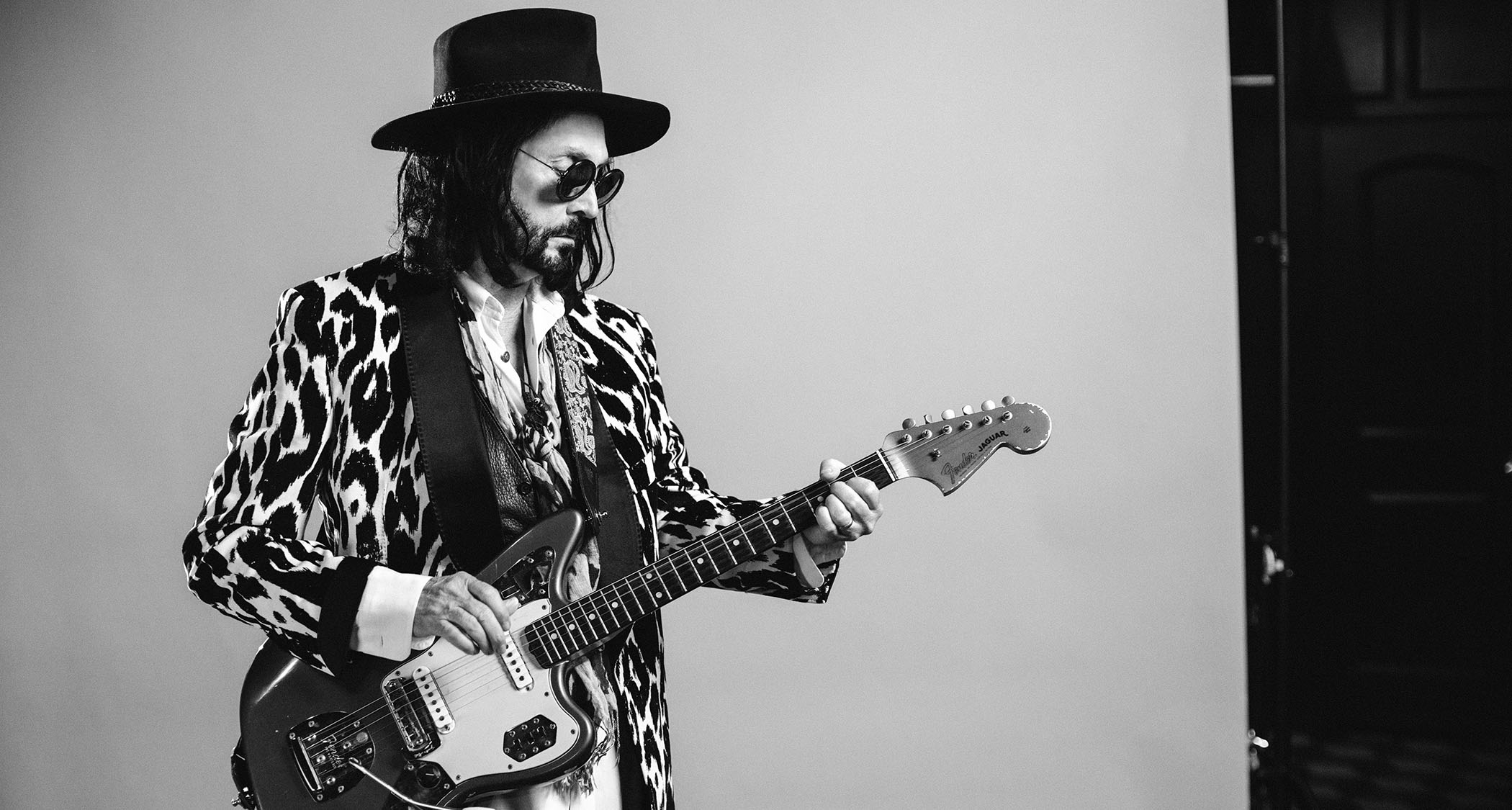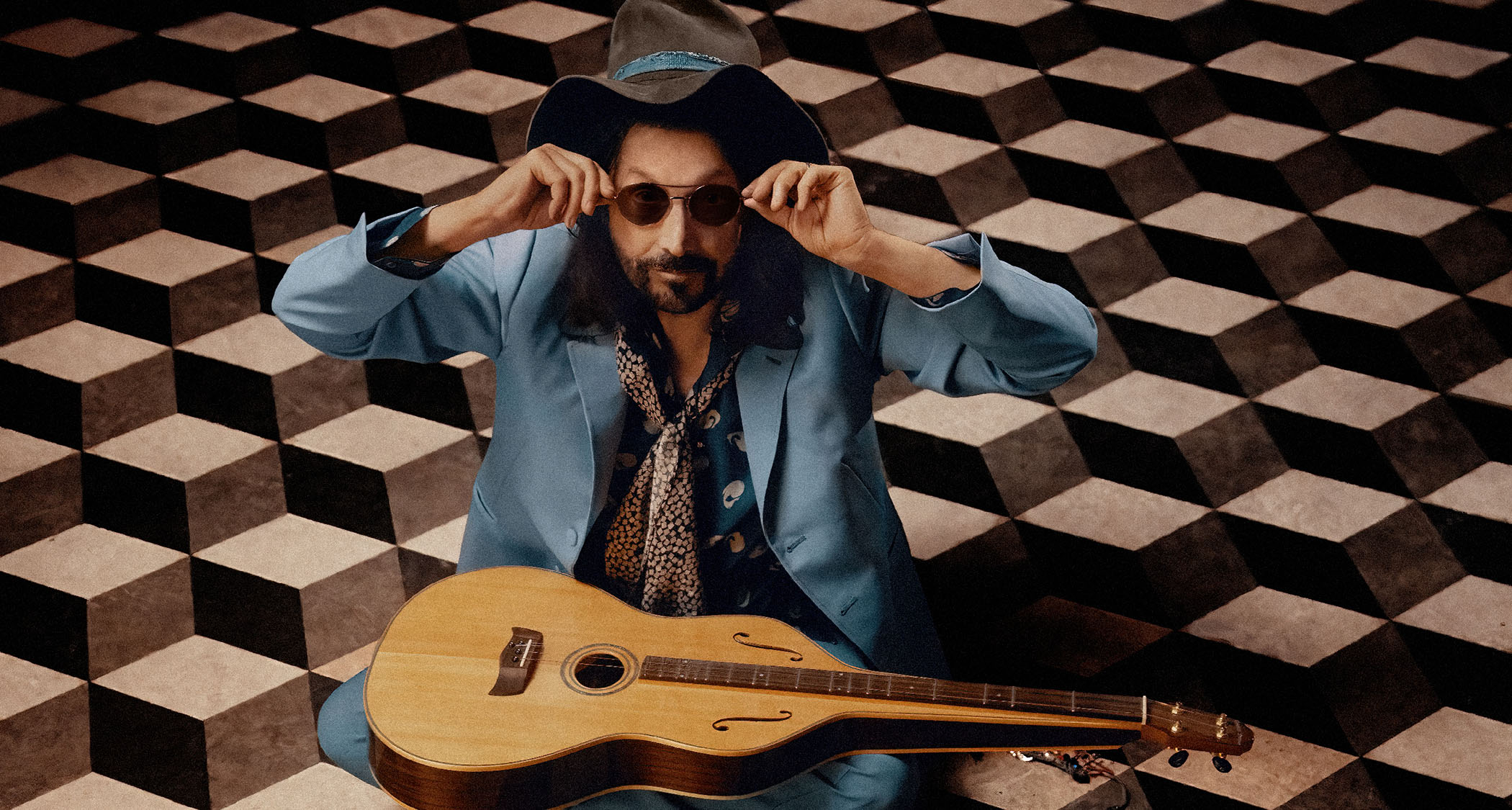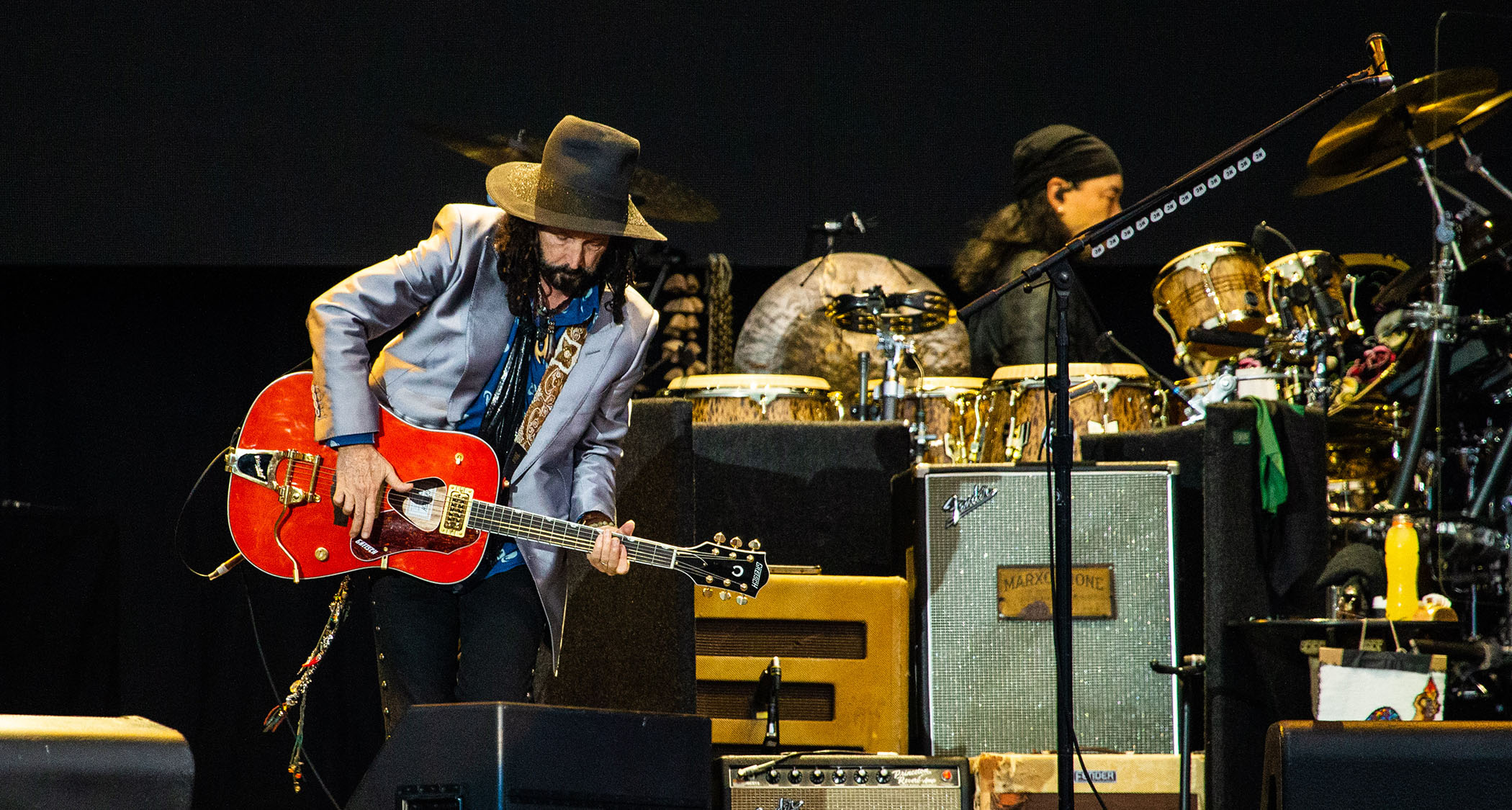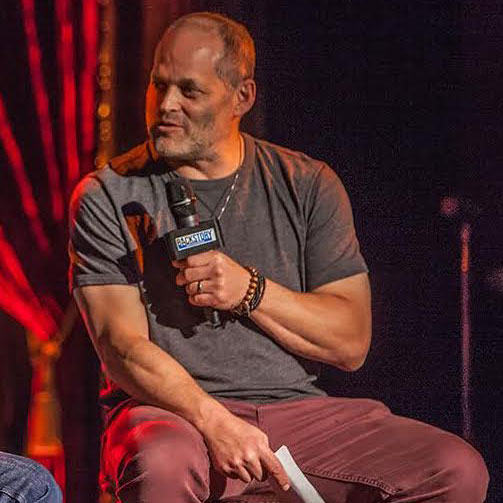“Mick Fleetwood asked me to join the band, but I don’t think Stevie voted against me… I don’t play like Lindsey, but I was able to do the songs justice”: Mike Campbell on the challenge of joining Fleetwood Mac and what he learned from Tom Petty

Mike Campbell was Tom Petty’s right-hand man throughout his career. They started playing together as teenagers in Mudcrutch, moved to Los Angeles together and honed their music together, along with keyboardist Benmont Tench, the other band member who was there from Petty’s beginning.
Campbell wasn’t only the Heartbreakers’ lead guitarist; he was the only band member Petty regularly co-wrote with, and that includes landmark songs like Refugee, Here Comes My Girl and Running Down a Dream. Campbell also co-produced many of the band’s albums and did some landmark work with others.
He wrote and played on Don Henley’s The Boys of Summer and Stevie Nicks’ Stop Draggin’ My Heart Around and worked with a range of other artists, from Bob Dylan to Aretha Franklin.
When Petty died in 2017, Campbell replaced Lindsey Buckingham in Fleetwood Mac and stayed put for a two-year world tour before turning to the Dirty Knobs, the group he had formed in 2000 as a live outlet during Petty’s touring breaks.
The Dirty Knobs, featuring Heartbreakers drummer Steve Ferrone alongside guitarist Chris Holt and bassist Lance Morrison, both of whom have worked with Henley, released Vagabonds, Virgins & Misfits on June 14. It is their third album since 2000.
“I had a big interest in doing my own songs and learning how to front a band,” Campbell says. “While I was in a band with Tom, out of respect for our relationship and our songwriting arrangement, I didn’t want to do anything that would throw that off-kilter..”
Are you enjoying it?
All the latest guitar news, interviews, lessons, reviews, deals and more, direct to your inbox!
“Yes. I learned a lot watching Tom front the Heartbreakers all those years, and I’m picking up how to be at the mic, engage the audience, try to sing in tune, remember all the lyrics and lead the band.
“It’s a lot more than I thought, and I have a lot more respect for him now that I’m trying to do it all. But I’m enjoying it and getting a lot better each time – and the band is just great. I love playing music and I can’t see going through the rest of my life without doing so.”
Remembering lyrics is like stretching a different part of your brain; it’s not like the muscle memory of having a million guitar parts in your fingers.
"Absolutely. It’s a corner of my brain that was asleep. What’s the next verse? What’s the chorus? What’s the bridge? How do I tell the band where to move or break down? That part of my brain has been awoken out of necessity. I love playing lead guitar, but I also like to put chords together and write songs, and that’s as much or more satisfying than playing a great solo. I try to do both."
You mentioned Tom putting lyrics to your music. Is that how you wrote together?
“Usually, I’d write music and leave him a blank palette – basically a finished record with no vocals – and if he liked it, he’d bring it in the next day and start singing along with what he’d written. He would just get in there, find the melody, come up with some words and then show me what he’s got.
“He would hand my music back to me as a better song. The songs he wrote on his own, he would usually bring them in fully finished, then I would just listen and play along, and by the end of the song, I’d have an alternate guitar part that hopefully made the song better. A lot of our writing was very organic.”
Do you approach a solo differently on a song where you were the primary writer?
“No, I’ve always had the same process in the studio. I’m usually engaged in the rhythm track and let the vocal do its thing. If there’s room for a guitar lick, I’ll put it on the live track, but I rarely work them out.
“If there’s a solo that I have to go back to, like the end of Running Down a Dream, I approach it the same way; I don’t compose solos in advance. I like to run the track and see where my fingers go and what my mind picks up in the moment.
“A lot of times it’s a bunch of sloppy crap, then two little pieces that show me the way I should be playing the solo. So I can roll it back again and use that as a template to do a better solo. I do like to wing it; that’s where the spirit is.”
![Mike Campbell & The Dirty Knobs - Hell Or High Water (feat. Lucinda Williams) [Official Music Video] - YouTube](https://img.youtube.com/vi/5a4B9OnnlLQ/maxresdefault.jpg)
Playing with the same guys for years leads to easy, unspoken communication. Have you had to work to rebuild that with the Dirty Knobs?
“The Heartbreakers had a history of mental telepathy where we would just instinctively know how to complement each other, which was a blessing that could also be a curse. We would sometimes fall into repeating ourselves, but it’s a comfort to know that this guy is not gonna let you down, that you can get a feedback going between you and inspire each other.
The Heartbreakers had a history of mental telepathy where we would just instinctively know how to complement each other, which was a blessing that could also be a curse
“In this band, we’ve now been together long enough that we’re starting to develop that. They can sense where I’m gonna go, or I can give them a look or a shoulder move and they’ll follow me.
“And thank God we now have Steve Ferrone on drums. He’s really great and we have a history so he knows me really well, which makes it easy to play with dynamics. If I want the song to get quiet or build up in an unscripted moment, he can pick up on that.
“The whole thing is just kind of coming alive and becoming a great band. I’ll love the Heartbreakers forever, but this is like starting over and we have a lot of fun. I’m blessed to have these guys.”
![Mike Campbell & The Dirty Knobs - Dare To Dream (feat. Graham Nash) [Official Music Video] - YouTube](https://img.youtube.com/vi/FhGeeldeedk/maxresdefault.jpg)
How was the Fleetwood Mac experience? It was a blip in your career, but you did some significant shows with them in what seems like it would have been a tough situation – although you have a long history with Stevie Nicks.
“It’s interesting that you use the word blip because we went around the world for two years and played a lot of shows. It was actually a beautiful and long journey – but now when I look back at it, it does feel as you described it. It went by and became something that happened but is hard to believe. Like, I went to high school once and I toured the world with Fleetwood Mac. [Laughs]
“It was an interesting experience. Mick Fleetwood asked me to join the band, but I don’t think Stevie voted against me. It was a challenge because I don’t usually play other people’s guitar parts. I had to do something I’ve never really done before and try to emulate some of Lindsey’s melodies that the songs need. I don’t play like Lindsey, but I was able to do the songs justice. That was a good bit of work and it was good for me.

“The gigs were incredible, and they treated me and my wife like royalty: private planes, big hotels, lots of days off all around the world. It was almost like a beautiful paid vacation, and the music was always good. I would look around and see Mick and John McVie and go, ‘Holy shit. How did I get here?’ It was just another blessing in my life.
“I learned a lot about the guitar by having to learn Lindsey’s parts. Nobody sounds like somebody else, but I did the best I could and brought my own vibe to it.
“Also, every night we would do Free Falling as a tribute to Tom, and that was very emotional. Stevie was wonderful and she carries a vocal coach to warm up her voice, and I came by every day and he worked with me to learn how to get more character and strength and pitch in my voice. He taught me this vocal routine that helped me a lot, and I’m not sure I’d be doing what I am as well without that.”

At what point in your relationship with Tom did your roles become defined – that he would be the front man and you would be the guitar player?
“Right away. I wasn’t singing and I was beginning to write a little music, but he already was writing songs and he just had that charisma.
“He was playing bass when I met him in Mudcrutch, then he borrowed my Strat and we switched him over to guitar and got a bass player so he could present his songs the way he was writing them. We just had a natural respect for each other. I was happy to be the guitar player, and I think he was happy to have me there.”
One of the joys of seeing the Heartbreakers was salivating over the instruments you and Tom played. Now that you have a smaller production, are you traveling with fewer instruments?
I have a guitar obsession... I’ve quit buying them because I kind of have one of every guitar that I ever dreamed of. At this point buying them is kind of pathetic
“Yes. I have a guitar obsession. I sold about 120 of them a couple of years ago because I don’t have room for them anymore. I’ve quit buying them because I kind of have one of every guitar that I ever dreamed of. At this point buying them is kind of pathetic.
“I play them all in the studio, but I just take a few essentials on the road because you’re right – it is a smaller production. That includes a Rickenbacker 12-string, a ’56 Tele that Gene Parsons installed a B-bender on, and a white Firebird that I got in a pawn shop for 500 bucks on the Fleetwood Mac tour.
“Now that I’m leading the band and I’ve got all these things I must concentrate on, the last thing I want to do is try a different guitar just for fun. I just want it to be in tune because I’ve got to think about other stuff now. It’s a different gig!”
- Vagabonds, Virgins & Misfits is out now via BMG.
Alan Paul is the author of three books, Texas Flood: The Inside Story of Stevie Ray Vaughan, One Way Way Out: The Inside Story of the Allman Brothers Band – which were both New York Times bestsellers – and Big in China: My Unlikely Adventures Raising a Family, Playing the Blues and Becoming a Star in Beijing, a memoir about raising a family in Beijing and forming a Chinese blues band that toured the nation. He’s been associated with Guitar World for 30 years, serving as Managing Editor from 1991-96. He plays in two bands: Big in China and Friends of the Brothers, with Guitar World’s Andy Aledort.




